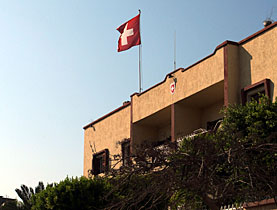
Swiss hostages case swings in Libya’s favour

A Geneva-based Arab expert tells swissinfo.ch that there are clear signs that Libya is gaining an upper-hand in a row between Tripoli and Bern.
Hasni Abidi, director of the Study and Research Center for the Arab and Mediterranean World, says the return of two Swiss hostages to the Swiss embassy in Tripoli on Monday shows that Libya knows how to use the media.
“Libya releases Swiss businessmen,” wrote the BBC. French newspapers Libération and Figaro also described the men as “freed”. The sentiment was echoed in the Arab media.
But the pair still cannot leave the country. Arrested more than a year ago for alleged visa irregularities, they were released but refused exit visas and then most recently, abducted by the Libyan authorities.
By being slow to respond to the situation, Switzerland has failed to capitalise on the human aspect of the case and could also stand to lose international support during the standoff between the two countries, Abidi says.
Relations between Switzerland and Libya have been strained since the arrest of Moammar Gaddafi’s son in Geneva in 2008. In the first hardening of its tone, Switzerland recently suspended an agreement that aimed to normalise relations between the two countries.
swissinfo.ch: How have the media – and outlets in the Muslim world in particular – reflected on the news of the Swiss nationals’ return to the Swiss embassy in Tripoli?
Hasni Abidi: The crisis between Switzerland and Libya has not been publicised much in the Arab press. But that has changed since the Swiss authorities took a tougher stance on October 22 and especially since Monday.
Al Jazeera’s Maghreb news programme devoted a piece to the “liberation” of the two Swiss. The release of the two hostages also made the headlines of Asharq Al-Awsat, the leading pan-Arab daily. These articles, rather favourable to Libya, show Tripoli as having made a gesture full of humanity. One of these articles asserts that the two Swiss had been taken into hiding to prevent them being removed by a commando.
With the kidnapping of the two Swiss, Bern had a humane argument that echoed in the Arab press. The return of the two Swiss to the embassy is good news. But it is Libya that is likely to profit from it.
swissinfo.ch: With this coverage in the media, has Libya got the upper-hand in this standoff?
H.A.: Absolutely. After the disappearance of the two Swiss, Bern waited three weeks before speaking publicly about the kidnapping and giving a tacit green light to the international community and civil society to become involved.
The Libyans then made a critical evaluation of the situation and realised that the secret detention of the two Swiss was counterproductive.
swissinfo.ch: Could Switzerland lose its international support as the two Swiss are now just being detained in Libya?
H.A.: I was surprised to see that in the Arab press, and also in the west, the matter seemed to be almost resolved. But the coverage of the crisis by the international press shows that the human dimension of this case had a much greater impact on international opinion that its political dimension [such as the international arbitration tribunal and the agreement between the two states].
There is now a fear that this burgeoning international mobilisation will lessen.
Switzerland should keep up the pressure by repeating that the case is not closed. Civil society could continue its involvement by saying that the drama of the two Swiss nationals continues and that Bern is still awaiting their return to Switzerland.
swissinfo.ch: Have the Swiss authorities made sufficient use of the media element which the Libyans seem to master so well?
H.A.: We must concede to Libya: accustomed to this kind of crisis, this country knows better than others that using the media is very important and can even become a factor in negotiations.
Switzerland appears to be discovering the usefulness of the media in this kind of crisis, since its diplomacy is based on discretion. It is therefore urgent that Swiss diplomacy incorporates the new hand it has been dealt by using the media wisely to defend the interests of the country.
Frédéric Burnand in Geneva, swissinfo.ch (Translated from French by Jessica Dacey)
The two Swiss businessmen were first arrested in July 2008, in a response by Libya to the arrest of Moammar Gaddafi’s son Hannibal in Geneva for alleged mistreatment of two servants.
On their first arrest, the Swiss nationals were kept in “alarming conditions”, the foreign ministry said. They were later released but refused exit visas.
In September 2009 Libya again refused to let the two Swiss nationals leave the country, breaking a promise to free them by September 1.
The two nationals then disappeared after undergoing a medical check-up in Tripoli. They were returned to the Swiss embassy in Tripoli on November 9.
President Hans-Rudolf Merz said on November 10 that he was happy that the two men were returned to the Swiss embassy. He said it was positive that the case had started to “move again”, but could not for the moment say why the two men were returned to the embassy and when they might be allowed to leave Libya.

In compliance with the JTI standards
More: SWI swissinfo.ch certified by the Journalism Trust Initiative




























You can find an overview of ongoing debates with our journalists here . Please join us!
If you want to start a conversation about a topic raised in this article or want to report factual errors, email us at english@swissinfo.ch.